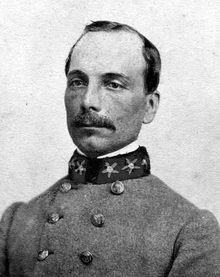Ambrosio José Gonzales
| Ambrosio José Gonzales | |
|---|---|
 |
|
| Born | October 3, 1818 Matanzas, Cuba |
| Died | July 31, 1893 (aged 74) Bronx, New York |
| Place of burial | Woodlawn Cemetery, Bronx, New York *Plot: Lot A, Range 131, Grave 20 |
| Allegiance |
|
| Service/branch |
|
| Years of service | 1861–1865 |
| Rank |
|
| Commands held | Chief of Artillery, Department of South Carolina, Georgia, and Florida |
| Battles/wars |
American Civil War *Battle of Fort Sumter *Battle of Honey Hill |
Colonel Ambrosio José Gonzales (October 3, 1818 – July 31, 1893) was a Cuban revolutionary who became a Colonel in the Confederate States Army during the American Civil War. Gonzales, as a revolutionary, wanted the United States to annex Cuba. During the American Civil War he served as the Chief of artillery in the Department of South Carolina, Georgia, and Florida.
Gonzales was born in the town of Matanzas, Cuba, in 1818. His father was a schoolmaster and founder of the first daily newspaper in Matanzas. His mother was a member of a prominent local family. After the death of his mother, his father sent the nine-year-old Ambrosio to Europe and New York City, where he received his primary and secondary education. He returned to Cuba and attended the University of Havana where he earned degrees in arts and sciences and later in law, graduating in 1839. He returned to Matanzas and became a teacher and later a professor for the University of Havana, where he taught languages (he claimed fluency in English, French, Spanish, and Italian): he was also well instructed in mathematics, and geography. In 1845, following the death of his father, he began two years traveling in Europe and the United States, returning to Cuba to resume his post at the university.
In 1848, Gonzales joined with a secret organization named the Havana Club that sought to have Cuba annexed by the United States in order to liberate the island from Spanish rule - an aim actively shared by a faction in US politics. The movement found encouragement from a surge of expansionism in the United States, particularly in the South, following the U.S. annexation of Texas in 1845.
The Havana Club group pursued its goal of annexation to the U.S. through a combination of financial, diplomatic and military means. His association and influence with prominent U.S. southerners led him to author a manifesto encouraging U.S. annexation of Cuba. By 1849, Gonzales became interested in the revolutionary plans of Venezuelan General Narciso López, who ultimately led several military expeditions, known as filibusters, to try to liberate Cuba from Spain rule. Between 1849 and 1851, Gonzales accompanied López in several of his filibuster expeditions. The Spanish authorities set up a trap to capture López, but López was able to escape and sought asylum in the United States.
...
Wikipedia
